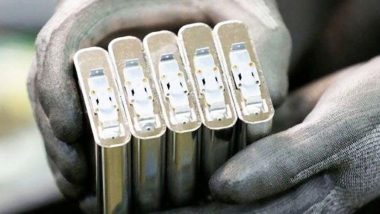Led by Gautam Adani, mines, renewable energy, ports, electricity, etc., are among the sectors the Guatam Adani’s Group has a presence in. It is now endeavouring to manufacture lithium ion battery indigenously in addition to other companies like Tata, Reliance among others.
With the union government announcing a Rs 18,100 crore PLI scheme for manufacturing of lithium-ion cells, companies from all walks of life are said to have shown interest in the same.
This include Reliance Industries Ltd, Bharat Heavy Electricals Ltd, Tata Chemicals, Larsen and Toubro Ltd and the Adani Group founded by Gautam Adani; mines, coal and parliamentary affairs minister Pralhad Joshi has, in fact, revealed that lithium exploration project has been undertaken in Karnataka and Rajasthan by the Atomic Minerals Directorate for Exploration and Research (AMDER).
The government is sparing no effort in incentivising lithium production and private players too are tapping into the same. On the larger scheme of things, this definitely bodes well for India’s e-mobility sector. However, problem lies in the fact that there are no enough lithium reserves.
In fact, India’s lithium needs are met entirely through imports, which tripled to a whopping $1.2 billion in FY19 from $384 million in FY17. Furthermore, up until recently, experts are of a view that no effort has been made to explore the reserves of this rare metal and tap into their potential. Hopefully, the recent endeavours by the government and private players will help in turning the tides for the better.
Adani Group, for one, has been eyeing lithium business way before the PLI scheme has been rolled out. Back in 2019 when it announced Rs 55,000 crore investment in Gujarat, establishment of a lithium ion battery manufacturing complex was also in the pipeline. Led by Gautam Adani, mines, renewable energy, ports, electricity generation and transmission and infrastructure are some of the sectors that the group has a major presence in.
Similarly, Tata Motors has also announced its plans to launch 10 battery electric vehicles in India by 2025. Its parent company, Tata Sons, is said to have been scouting business opportunities in lithium-ion cell manufacturing in the country as well as Europe.
India is taking its baby steps towards achieving net zero carbon emissions just like its global counterparts. However, several factors like the exorbitant price of lithium-ion battery, which forms a major component of EV vehicles, come off as major hurdles. Thus, manufacturing them indigenously can ultimately push the hybrid and electric vehicles marketP













 Quickly
Quickly


